February/2023 Latest Braindump2go 300-630 Exam Dumps with PDF and VCE Free Updated Today! Following are some new Braindump2go 300-630 Real Exam Questions!
QUESTION 29
What is a use of the Overlay Multicast TEP in Cisco ACI Multi-Site communication?
A. to perform headend replication
B. to act as the source IP for BUM traffic
C. to establish MP-BGP adjacencies with remote spines
D. to send and receive unicast VXLAN data plane traffic
Answer: B
Explanation:
https://www.cisco.com/c/en/us/solutions/collateral/data-center-virtualization/application-centric-infrastructure/white-paper-c11-739609.html#CiscoACIMultiSiteoverlaydataplane
QUESTION 30
What are two characteristics of Cisco ACI and Spanning Tree Protocol interaction? (Choose two.)
A. When a TCN BPDU is received in a VLAN, Cisco ACI flushes the endpoints for the associated encapsulation.
B. STP BPDUs are dropped due to MCP.
C. MST BPDUs are flooded correctly in Cisco ACI fabric without additional configuration.
D. BPDU filter and BPDU guard can be configured on Cisco ACI leaf edge ports.
E. Cisco ACI must be configured as the STP root for all VLANs.
Answer: DE
Explanation:
https://www.cisco.com/c/en/us/td/docs/switches/datacenter/aci/aci_virtual_edge/configuration/1-x/b_Virtual_Edge_Config_Guide_1_2_2/b_Virtual_Edge_Config_Guide_1_2_2_chapter_0101.html
QUESTION 31
Where are STP BPDUs flooded in Cisco ACI fabric?
A. in the bridge domain VLAN
B. in the native VLAN ID
C. in the access encapsulation VLAN part of different VLAN pools
D. in the VNID that is assigned to the FD VLAN
Answer: A
Explanation:
https://www.cisco.com/c/en/us/solutions/collateral/data-center-virtualization/application-centric-infrastructure/white-paper-c11-737909.html
QUESTION 32
Refer to the exhibit. How are the STP BPDUs forwarded over Cisco ACI fabric?
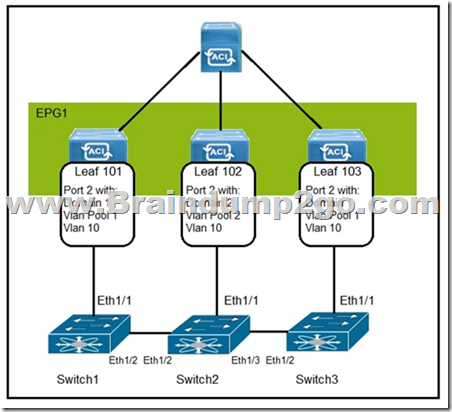
A. STP BPDUs that are generated by Switch2 are received by Switch1 and Switch3.
B. Cisco ACI fabric drops all STP BPDUs that are generated by the external switches.
C. Cisco ACI acts as the STP root for all three external switches.
D. STP BPDUs that are generated by Switch1 are received only by Switch3.
Answer: A
Explanation:
https://www.linkedin.com/pulse/cisco-aci-network-behaviour-stptcn-how-identify-loop-ankit-kulshresta
QUESTION 33
How does Cisco ACI manage the STP BPDUs between two pods?
A. Cisco ACI spines perform ingress replication for STP BPDUs
B. Cisco ACI spines suppress STP BPDUs to be forwarded to other pods
C. BPDUs are forwarded over IPN using the bridge domain GIPo multicast address
D. Special multicast group 239.255.255.255 is used to forward STP BPDUs
Answer: C
QUESTION 34
Which action must be taken to connect two nonsilient servers in active/standby mode to two ACI leaves?
A. Implement a virtual PortChannel on ACI leaves
B. Enable ARP flooding for the bridge domain if the MAC address of the active interface changes after NIC failover
C. Configure ARP flooding for the bridge domain if the MAC address of the active interface stays identical after a NIC failover
D. Disable dataplane learning to avoid endpoint flapping
Answer: C
Explanation:
https://www.cisco.com/c/en/us/td/docs/dcn/whitepapers/cisco-application-centric-infrastructure-design-guide.html
QUESTION 35
How many APICs are recommended by Cisco for a Cisco ACI fabric?
A. 6
B. 5
C. 4
D. 3
E. 2
F. 1
Answer: D
QUESTION 36
Which statement about when Cisco ACI is integrated with Microsoft Azure pack is true?
A. The application network profile is created in Windows Systems Center and pushed to the Cisco APIC.
B. The application profile is created in Windows Azure Pack Management Portal and pushed to the Cisco APIC.
C. The application network profile is created in the Cisco APIC and pushed to Windows Azure.
D. The application network profile is created in the Cisco APIC and pushed to Systems Center.
Answer: C
QUESTION 37
Refer to the exhibit. How is the ARP request from VM1 forwarded when VM2 is not learned in the Cisco ACI fabric?
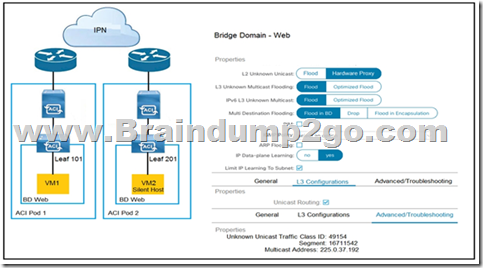
A. Leaf 101 forwards the ARP request to one of the proxy VTEP spines.
B. POD1 spine responds to the ARP request after the POD1 COOP is updated with the VM2 location.
C. Leaf 101 encapsulates the ARP request into a multicast packet that is destined to 225.0.37.192.
D. Leaf 101 switch consumes the ARP reply of VM2 to update the local endpoint table.
Answer: A
QUESTION 38
Which approach does Cisco ACI use to achieve multidestination packet forwarding between leaf switches in the same fabric?
A. Map VXLAN VTEP to the multicast group
B. Map VXLAN to PIM-SM protocol
C. Map VXLAN VNI to the multicast group
D. Map VXLAN to PIM-DM protocol
Answer: C
QUESTION 39
What does the VXLAN source port add to the overlay packet forwarding when it uses the hash of Layer 2, Layer 3, and Layer 4 headers of the inner packet?
A. ECMP
B. TCP optimization
C. disabled fragmentation
D. jumbo frames
Answer: A
Explanation:
https://www.cisco.com/c/en/us/support/docs/lan-switching/vlan/212682-virtual-extensible-lan-and-ethernet-virt.html
QUESTION 40
Which two actions are the Cisco best practices to configure NIC teaming load balancing for Cisco UCS B-Series blades that are connected to the Cisco ACI leaf switches? (Choose two.)
A. Create vPC+
B. Enable LACP active mode
C. Create PAgP
D. Create vPC
E. Enable MAC pinning
Answer: BE
QUESTION 41
An organization migrates its virtualized servers from a legacy environment to Cisco ACI. VM1 is incorrectly attached to PortGroup IT|3TierApp|Web.
Which action limits IP address learning in BD1?
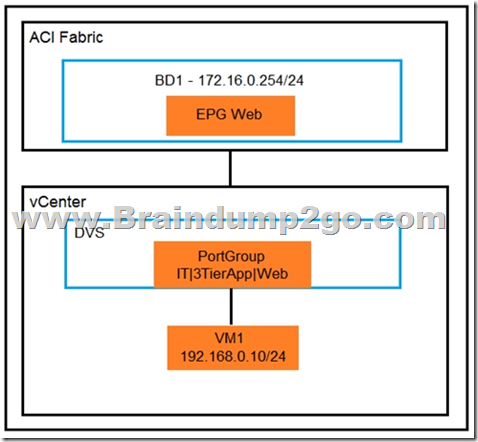
A. Enable Enforce Subnet Check
B. Enable Rouge Endpoint Control
C. Enable GARP-based EP Move Detection Mode
D. Disable Remote EP Learn
Answer: C
QUESTION 42
Refer to the exhibit. What must be configured to allow the PBR node (LB-int) to monitor the availability of the endpoint that is in the EPG server?
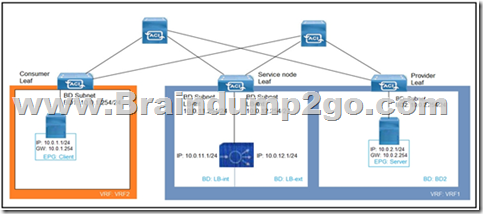
A. Endpoint Dataplane Learning
B. Unicast Route disabled for client and server bridge domains
C. PBR node tracking
D. Direct Connect in the service graph template
Answer: A
QUESTION 43
An engineer must limit local and remote endpoint learning to the bridge domain subnet. Which action should be taken inside the Cisco APIC?
A. Disable Remote EP Learn
B. Enable Enforce Subnet Check
C. Disable Endpoint Dataplane Learning
D. Enable Limit IP Learning to Subnet
Answer: B
Explanation:
https://www.cisco.com/c/en/us/solutions/collateral/data-center-virtualization/application-centric-infrastructure/white-paper-c11-739989.html
QUESTION 44
Which statement describes why ACI planning and deployment services are often considered critical to customer success?
A. Cisco APIC requires a database administrator to manage the device database.
B. ACI fabric is a new approach to networking with integration to external applications.
C. ACI fabric requires custom scripting to operate.
D. ACI fabric is a development framework for customers to build applications.
Answer: D
QUESTION 45
Which action extends an EPG outside of the Cisco ACI fabric?
A. Enable a routing protocol on the border leaf.
B. Extend the bridge domain to an outside network.
C. Create a Layer 3 port.
D. Manually assign a port to a VLAN and map the VLAN to an EPG
Answer: B
QUESTION 46
An engineer deployed a Cisco ACI fabric and noticed that the fabric learns endpoints from subnets that are not configured on a bridge domain. To meet strict security requirements, the engineer must prevent this behavior. Which action must be taken to prevent this behavior?
A. Activate Enable Data Plane Endpoint Learning
B. Implement Pervasive Gateway
C. Configure Static Binding
D. Enable Enforce Subnet Check
Answer: D
QUESTION 47
Refer to the exhibit. An engineer is configuring a vSwitch policy in the existing Cisco ACI fabric. The requirement is for the Cisco ACI leaf to learn individual MAC addresses from the same physical port. Which vSwitch policy configuration mode must be enabled to meet this requirement?
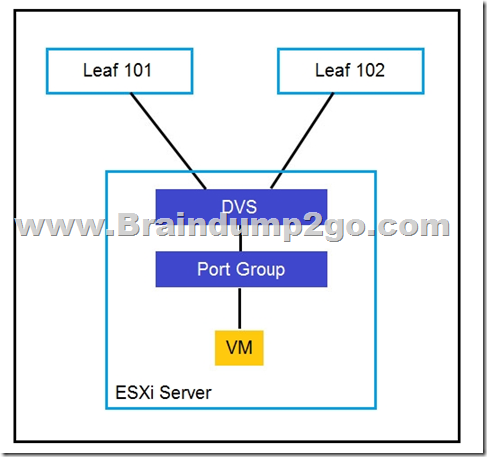
A. MAC pinning
B. MAC binding
C. LACP passive
D. LACP active
Answer: A
QUESTION 48
A host that is connected to a Cisco ACI fabric leaf switch sends an ARP request. Which transmission method does the ingress switch use to send the ARP requests?
A. anycast
B. broadcast
C. multicast
D. unicast
Answer: D
QUESTION 49
An engineer is implementing the Cisco ACI fabric but is experiencing loops detected from endpoints. When the issue was investigated, it was discovered that the packets are received with the same source IP address but from different leaf switch ports. The engineer must prevent the issue from happening in the future and make sure that the port is brought back up if it was disabled due to the loop discovered. Which set of actions must be taken to meet these requirements?
A. Enable the enforce endpoint check and set the Rouge EP detection interval
B. Enable the rogue endpoint and set the Error Disabled Recovery Policy
C. Enable the remote endpoint limit and set the Interface override
D. Enable reverse path forwarding and set the Hold Interval
Answer: B
QUESTION 50
An engineer implements the Cisco ACI solution and needs to confirm that the leaf switch correctly learns the remote endpoint MAC. Which information must be included in the VXLAN packet that is received from the Cisco ACI spine for the Cisco ACI leaf to learn MAC as a remote endpoint?
A. VRF
B. application profile
C. bridge domain
D. EPG
Answer: C
Explanation:
https://www.cisco.com/c/en/us/solutions/collateral/data-center-virtualization/application-centric-infrastructure/white-paper-c11-739989.html
QUESTION 51
Which action reduces the impact on workload when migrating from the existing Cisco NX-OS VXLAN network infrastructure to the Cisco ACI fabric?
A. Disable bridge domain unicast routing while a default gateway is in VXLAN infrastructure
B. Set the default gateway in the Cisco ACI and VXLAN fabrics
C. Use ACI spines for the Cisco ACI and VXLAN fabrics
D. Configure vPC between the standalone Nexus and the Cisco ACI leaf
Answer: B
Explanation:
https://www.cisco.com/c/en/us/td/docs/switches/datacenter/aci/apic/sw/migration_guides/migrating_existing_networks_to_aci.html#_Toc27467765
QUESTION 52
How is multicast traffic managed in a Cisco ACI fabric?
A. FTag trees are rooted at the spine nodes. Cisco APIC determines the roots.
B. FTag trees are rooted at the leaf nodes. Cisco APIC determines the roots.
C. FTag trees are rooted at the leaf nodes. The roots must be configured manually.
D. FTag trees are rooted at the spine nodes. The roots must be configured manually.
Answer: A
Explanation:
https://www.ciscolive.com/c/dam/r/ciscolive/emea/docs/2015/pdf/BRKAPP-9004.pdf
QUESTION 53
Refer to the exhibit. Which three actions should be taken to implement the vPC in the Cisco ACI fabric? (Choose three.)
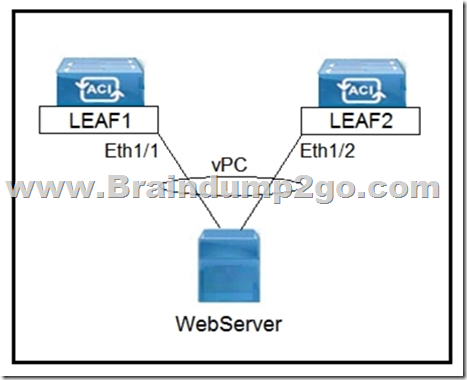
A. Select a common vPC interface policy group
B. Select individual interface profiles
C. Select common interface profiles
D. Select individual switch profiles
E. Select common switch profiles
Answer: ABE
QUESTION 54
What are two characteristics of Cisco ACI interaction with MSTP? (Choose two.)
A. A Cisco ACI leaf flushes all local endpoints in the received EPG when an MSTP TCN frame is received.
B. A static path binding is required for native VLAN to carry the MST BPDUs in existing EPGs.
C. Mis-cabling protocol is used to snoop the MSTP TCN packets.
D. A dedicated EPG must be created for the native VLAN ID with static bindings toward the MSTP-enabled switches.
E. The PVST simulation must be configured on external network switches to support MSTP.
Answer: CD
QUESTION 55
Cisco ACI fabric is migrated from network-centric mode to application-centric mode. What is possible in an application-centric design?
A. remapping of VLAN pools
B. migration of bare metal servers to virtual machines
C. creation of additional EPGs under one bridge domain
D. Cisco ACI VMM integration with hypervisors
Answer: C
QUESTION 56
What is a design implication for Cisco ACI using an application-centric approach?
A. Multiple VLANs and/or multiple EPGs are under one bridge domain
B. VLAN numbers are in the names of the bridge domain and EPG objects
C. One EPG is mapped to multiple bridge domains
D. One VLAN equals one EPG equals one bridge domain
Answer: C
QUESTION 57
What are two characteristics of network-centric design in Cisco ACI? (Choose two.)
A. There is open communication between EPGs
B. EPGs are used for microsegmentation
C. EPGs are different security zones
D. Applications define the network requirements
E. A bridge domain has one subnet and one EPG
Answer: BE
QUESTION 58
Refer to the exhibit. Between Cisco UCS Fls and Cisco ACI leaf switches, CDP is disabled, the LLDP is enabled, and LACP is in Active mode. Which two discovery protocols and load-balancing mechanism combinations can be implemented for the DVS? (Choose two.)
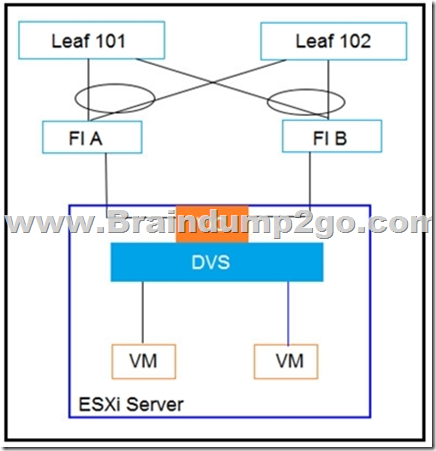
A. CDP enabled, LLDP disabled, and LACP Active
B. CDP disabled, LLDP enabled, and MAC Pinning
C. CDP enabled, LLDP disabled, and MAC Pinning
D. CDP enabled, LLDP enabled, and LACP Active
E. CDP enabled, LLDP disabled, and LACP Passive
F. CDP disabled, LLDP enabled, and LACP Passive
Answer: BE
QUESTION 59
Refer to the exhibit. An engineer wants to avoid connectivity problems for the endpoint EP1 when it reaches an external L3Out network through the gateway 10.2.2.254/24.
Which two configurations must be implemented in BD-BD2? (Choose two.)
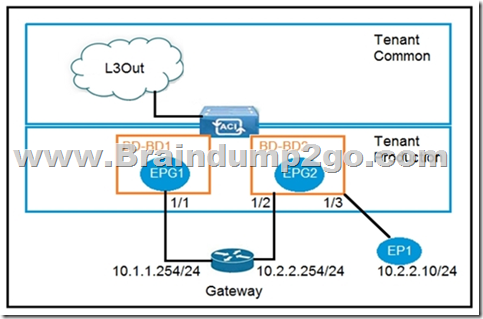
A. Disable unicast routing
B. Enable IP data plane learning for the VRF
C. Disable ARP flooding
D. Enable ARP flooding
E. Enable unicast routing
Answer: AC
Resources From:
1.2023 Latest Braindump2go 300-630 Exam Dumps (PDF & VCE) Free Share:
https://www.braindump2go.com/300-630.html
2.2023 Latest Braindump2go 300-630 PDF and 300-630 VCE Dumps Free Share:
https://drive.google.com/drive/folders/1HtEXn8tzewJoCLoHCdSosNbzye-PdRAE?usp=sharing
Free Resources from Braindump2go,We Devoted to Helping You 100% Pass All Exams!